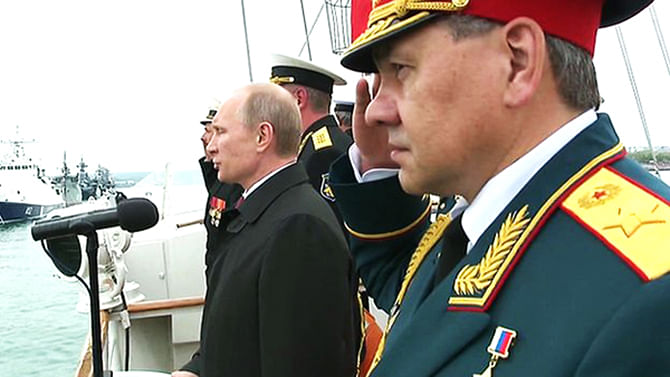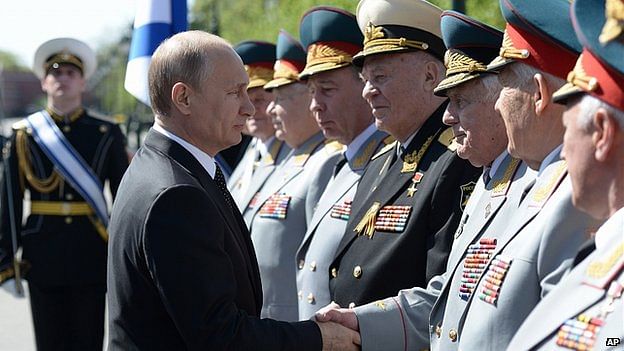Putin visits annexed Crimea

President Vladimir Putin has arrived in Crimea, his first visit to the peninsula since Russia annexed it from Ukraine in March.
He addressed sailors in Sevastopol harbour as part of celebrations marking the 1945 Soviet victory over the Nazis.
The Kiev government protested at the visit, calling it a "gross violation of Ukraine's sovereignty".
Meanwhile, reports say several people died in a shoot-out between Ukrainian troops and separatists in Mariupol.
Kiev recently launched an operation to retake official buildings occupied by pro-Russia rebels in Mariupol and several other cities in Ukraine's east and south.
Video footage from Mariupol showed armoured vehicles with Ukrainian flags in the streets, with the sound of gunfire in the background.
The Ukrainian security services said in a statement that one pro-Russian activist was injured, but there have been no casualties on the Ukrainian side.

SOVIET 'IRON WILL'
Ukraine's interim authorities earlier said the Soviet victory over the Nazis would be marked with a low-key wreath-laying ceremony.
The Kiev authorities feared that pro-Russian activists would try to stoke violence if there were any higher profile celebrations.
In a speech in Moscow earlier, Putin paid tribute to World War Two heroes and vowed to defend the "motherland".
Addressing thousands in Red Square during a huge, hour-long military parade, Putin did not mention Ukraine in his speech.
He told the crowd that 9 May, known as Victory Day in Russia, was a "day of grief and eternal memory" and stressed how the "iron will of the Soviet people" had saved Europe from slavery.
"It is a holiday when an overwhelming force of patriotism triumphs, when all of us feel particularly acutely what it means to be loyal to the motherland and how important it is to defend its interests," he said.
Russian state TV reported the Red Square parade was the largest such event in 20 years.
German Chancellor Angela Merkel had said it would be a pity if Putin used the anniversary to visit Crimea.
Nazi Germany invaded the USSR - which included Ukraine - in June 1941 and advanced almost as far as Moscow before being driven back to Berlin in some of the fiercest fighting of the war.
Crimea was put under Ukrainian administration in 1954.
After the collapse of the USSR, Russia maintained a large military presence on the peninsula, and more than half of the region's population identified as ethnic Russian.
In the chaos that followed the ousting of pro-Russian President Viktor Yanukovych in February this year, Russian forces took over most of the peninsula.
Crimeans then held a referendum and voted to join Russia, though the vote was widely criticised as offering no real choice.
Pro-Russian separatists in south and eastern Ukrainian cities have now said they will hold secession referendums on Sunday.
Activists remain in control of many official buildings across the south and east despite a military operation by Kiev to remove them. Dozens of people have been killed in the unrest.

 For all latest news, follow The Daily Star's Google News channel.
For all latest news, follow The Daily Star's Google News channel. 




Comments